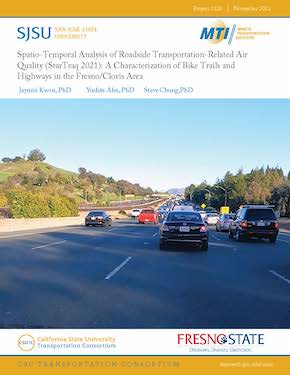- 408-924-7560
- mineta-institute@sjsu.edu
- Donate
Spatio-Temporal Analysis of Roadside Transportation-Related Air Quality (StarTraq 2021): A Characterization of Bike Trails and Highways in the Fresno/Clovis Area
The San Joaquin Valley is identified as an area with a high level of particulate matter (PM) in the air, reaching above the federal and state clean air standards (EPA 2019). Many of the cities in the valley are classified as the most polluted cities in the United States for both particulate matter and ozone pollution (American Lung Association, 2021). To resolve this issue, alternative forms of transportation have been considered in transportation planning. In this study, active transportation mode air quality was monitored on selected Woodward Park and Old Clovis trails and urban bike lanes. Real-time aerosol monitors, and low-cost sensors were carried in a backpack on bicycles during the sampling. Researchers collected GPS data via a portable GPS technology called Tracksticks. Driving transportation mode air quality data was acquired from the roadways within the Fresno/Clovis area, spanning six sampling routes, and during intercity trips between Fresno, Berkeley, and Los Angeles, for a total of five sampling routes. ‘On-Road' (outside vehicle) monitors were installed on the roof of a vehicle while ‘In-Vehicle’ monitors were installed inside the vehicle for comparison with the particulate pollution levels in the two contrasting microenvironments. The results showed the following three main outcomes: (1) clear relationships exist among PMs of different sizes; (2) there were greater variations in air quality of bike trails and On-Road samples than backyard and In-Vehicle samples; (3) we observed significant differences in air quality inside and outside the vehicle while driving local and intercity roadways; and (4) the road trip to the Bay area revealed that San Joaquin Valley has increased ambient PM 2.5 and black carbon (BC) levels compared to those in the Bay Area on every trip, regardless of the daily change of the air quality.
JAYMIN KWON, PHD
Dr. Kwon is an associate professor of Environmental and Occupational Health in the Department of Public Health. He obtained a BS and MS in Food Engineering and Biotechnology at Yonsei University, Korea and a MS and PhD in Environmental Sciences from Rutgers University, New Jersey. He joined Fresno State in 2011, after a postdoctoral fellowship at the School of Public Health in the University of Texas, Houston. His research focuses on epidemiological human exposure assessment of traffic emissions and adverse health effects, the development of sensors for air pollution monitoring, and the impact of traffic emissions in under-represented microenvironments and communities.
YUSHIN AHN, PHD
Dr. Ahn is an assistant professor in the Department of Civil and Geomatics Engineering, California State University in Fresno, CA. He received a B. Eng. Degree in civil engineering and a MSc degree in surveying and digital photogrammetry from Inha University, Korea in 1998 and 2000 respectively, and a M.Sc. and PhD in geodetic science from the Ohio State University, Columbus in 2005 and 2008 respectively. His research interests include digital photogrammetry, feature tracking, and sensor calibration and integration. Dr. Ahn received the Robert E. Altenhofen Memorial Scholarship from the American Society of Photogrammetry and Remote Sensing. He has been a certified photogrammetrist since 2014.
STEVE CHUNG, PHD
Dr. Chung is an associate professor in the Department of Mathematics at California State University, Fresno. He received a BS in Applied Mathematics at CalPoly Pomona, and his PhD in Statistics from Florida State University. His research focuses on time series analysis and applied statistics.
-
Contact Us
San José State University One Washington Square, San Jose, CA 95192 Phone: 408-924-7560 Email: mineta-institute@sjsu.edu






